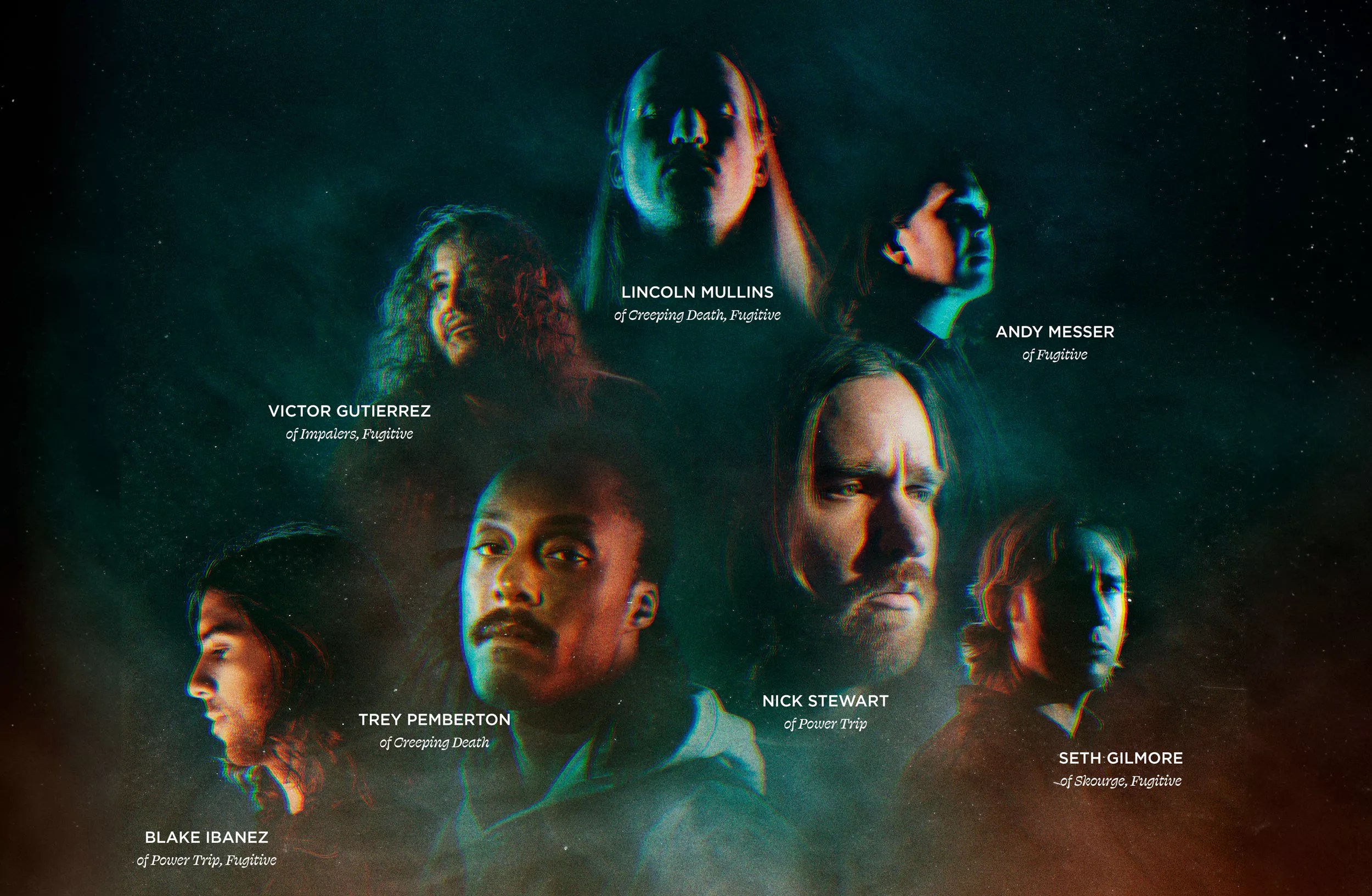
Christopher Durbin

Audio By Carbonatix
The kid in the wizard hat dives off the stage and disappears into the choppy sea of metalheads below. Devil-horned hands bob in the crimson-lit room as the crowd headbangs in unison. A circle pit kicks up again, forming a cyclone.
It’s three days before Halloween in Dallas, the second night of the annual Wrecking Ball Metal Madness fest at The Echo Lounge & Music Hall. Fugitive, a North Texas crossover-thrash brigade, has just launched into the final searing cut of its set, “The Javelin.” Hundreds of local metal fans roar in approval.
Ask an outsider about Dallas and they’ll probably reference the eponymous classic soap opera, the assassination of then-President John F. Kennedy or “America’s Team.” Ask them to describe the music scene, and they might cite greats of the Americana-country-cowpunk varieties: Old 97’s, The Dixie Chicks and Slobberbone, not to mention blues guitar legend Stevie Ray Vaughan.
Keep scraping the surface, though, and a black-gold wellspring spews forth: North Texas is home to some of the fiercest heavy music around.
A woefully non-encyclopedic history of the scene is sure to leave certain fans cold, but here are some indisputable highlights: There’s Rigor Mortis, the DFW thrash veterans who once landed a Capitol Records deal. There’s Pantera, Arlington’s Cowboys from Hell who forged a foothold in the international metal pantheon. Then, of course, there’s Power Trip.
Lead guitarist Blake Ibanez, a founding Power Trip member and veritable maestro of the subversive music scene, has kept busy with his latest band Fugitive. He’s been featured in Guitar World magazine and charged ahead with new music, released to critical acclaim.
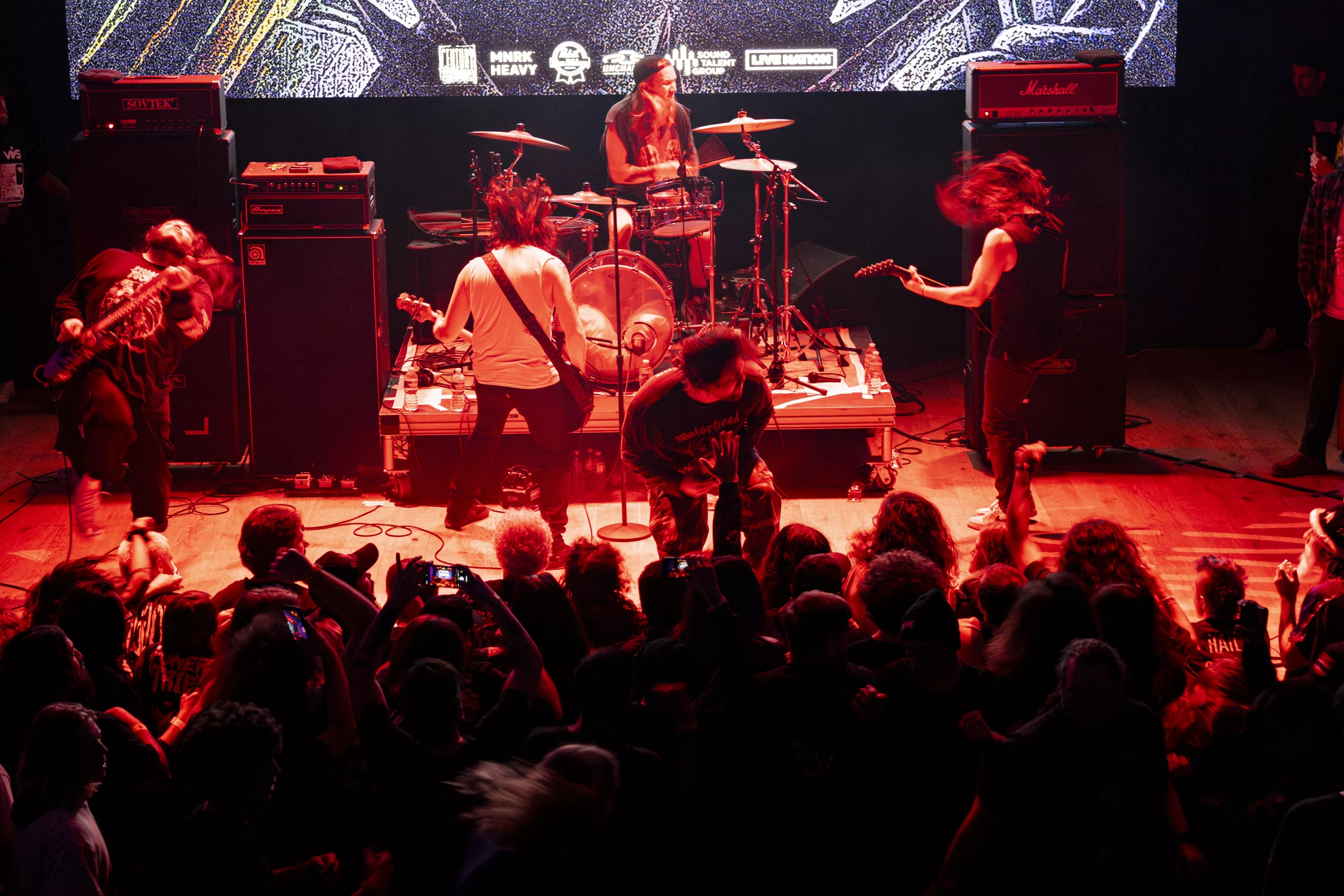
Fugitive performing at Wrecking Ball in October.
Elijah Smith
Ibanez opened up Fugitive’s Fort Worth rehearsal space to the Observer on a punishingly hot afternoon in August. It was days before what would have been a major show, performing ahead of arguably the most famous metal band in the world: Metallica.
Hellish weather forced the cancellation of Fugitive’s outdoor pre-show gig – temperatures were expected to soar to 110 degrees – but the group still had a set to execute later that same weekend as part of Metallica’s Dallas takeover.
Some metal pros might be crushed to learn that their Metallica pre-show had been scrapped. Fugitive seems to be taking it in stride as they set up to rehearse, crammed in a snug room lined from floor to ceiling with band posters.
“Yeah it’s a little disappointing, but it’s like, at the end of the day, you still get to do a lot of cool shit,” Ibanez says.
And there was plenty of cool shit ahead for Fugitive, such as an appearance at Wrecking Ball, presented by Dallas death metal giants Frozen Soul, plus a Florida fest in November and a gig in Austin after that.
Drummer Lincoln Mullins offers me candy during the interview and earplugs ahead of rehearsal. I accept both.
Ibanez counts Texas heavyweights Bitter End and Iron Age as formative influences in his early career. Most of the groups that get lumped into the North Texas metal category have roots in hardcore, he says. The scenes eventually started to merge.
“Hardcore and metal have pretty much fused together. It used to be way more segmented,” Ibanez says. “It’s a lot more popular, you know, more people going to shows. I mean, the biggest bands in DFW are basically metal bands.”
Not bad for a megachurch-stuffed region smack-dab in the Bible Belt.
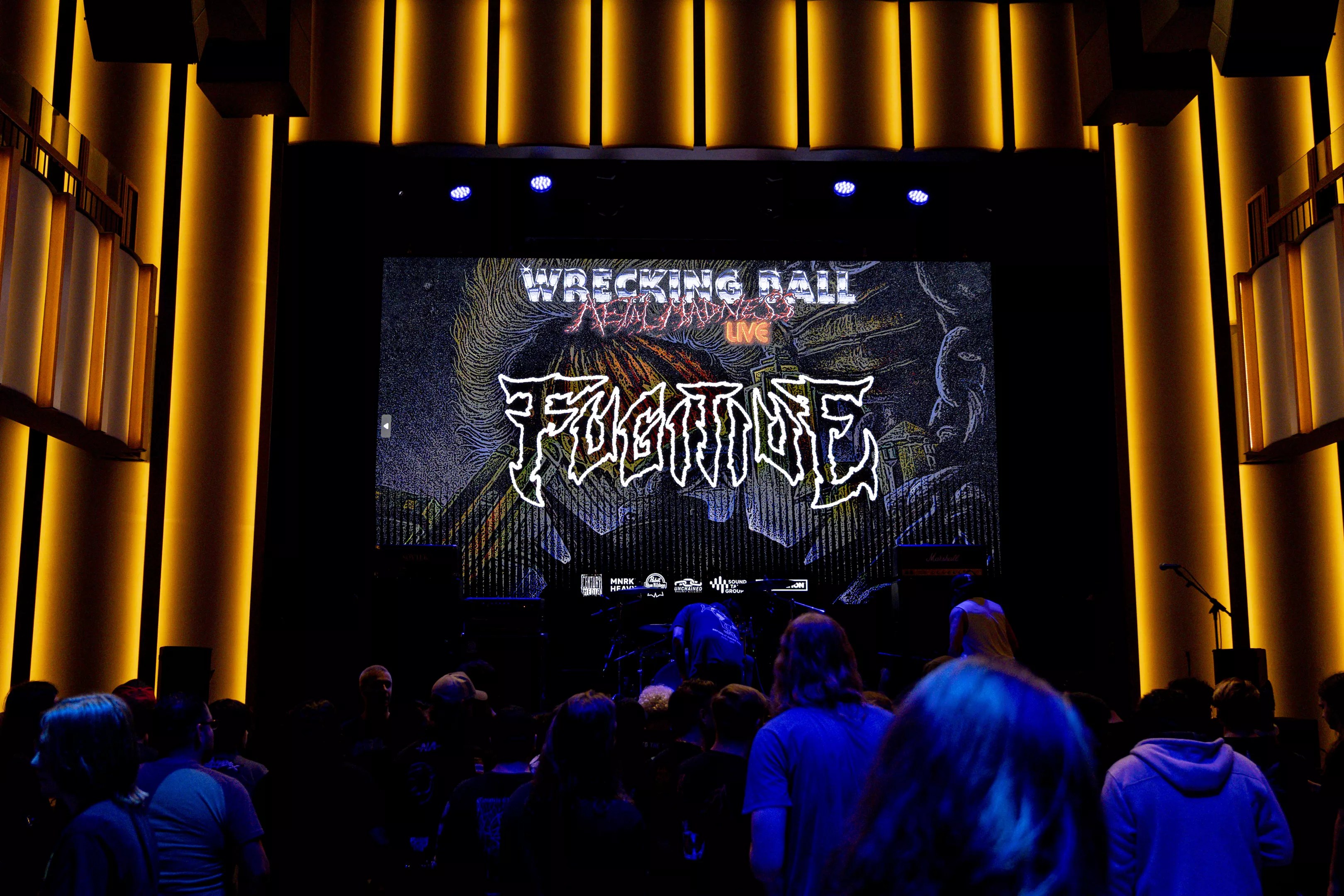
Fugitive’s lineup is composed of members of several other Texas heavy bands.
Elijah Smith
***
Power Trip’s Riley Gale repeatedly thrusts the microphone stand in the air like a spear, then sets it down onstage. The vocalist’s baseball cap casts a long shadow over his eyes. Gripping the mic with both hands, discordant tension builds as his bandmates launch into their debut album’s title track, “Manifest Decimation.”
“What the fuck is up, Singapore?” Gale snarls. The audience screams back in response. “We are Power Trip from Dallas, Texas. Let’s go!”
It’s Feb. 15, 2020, roughly a month before the COVID-19 pandemic will force countless shutdowns, quarantines and stay-at-home orders worldwide. Power Trip’s sophomore LP, Nightmare Logic, had been heralded an “international success.” The band had shared stages with patron saints of the underground: Anthrax, Lamb of God, Obituary and Danzig, to name a few.
In November of that year, Power Trip would be nominated for a Grammy.
But three months before, in late August, Gale died unexpectedly at the age of 34. The sudden loss struck a deep chasm in the bedrock of the Dallas hardcore community.
Gale was a man of conviction. While still in school, and despite his own small stature, he stood up for the kids who’d been picked on by bullies, Gale’s father told reporters after his death. He’d been a fierce defender of LGBTQ+ youth and an advocate for social justice reform.
“I think that racism is still very alive in this country and it needs to be dealt with,” Gale told the Observer in June 2020 amid the resurgence of the Black Lives Matter movement. “It’s going to take a lot of work – but for us, I stand on the side of peace and love.”
That ethos, coupled with Gale’s uncompromising work ethic, still permeates the North Texas heavy music realm today.
Power Trip guitarist Nick Stewart recalls coming up in a scene that barely had a pulse. The only hardcore bands to really commit to out-of-state touring were Iron Age, Bitter End and Gale’s first group, Balls Out. Hardly anyone was swinging for the fences.
Stewart, who’s been booking shows for some time, remembers curating stacked hardcore bills around 2006 and 2007. Even if the acts were from California or New York, relatively few folks would come through. He felt particularly bad after booking a band from Belgium that played to a room of around 30 kids.
Power Trip wanted to change that kind of ambivalence.
“I think we were just like, ‘We’re kind of tired of this. No one’s really sacrificing or trying to go for it,'” Stewart says. “And I think that’s when we started to see how far we could take it.”
First, Power Trip embarked on a nine-day tour, which Stewart calls a “disaster.” The next tour was a full U.S. outing: “also somewhat of a disaster – but fun.” Instead of giving up, the quintet kept pushing themselves, doing research and putting in the time and work.
When Power Trip was founded in 2008, there was no real blueprint to follow. “We had no idea what we were doing,” Stewart quips. A couple of little things helped out on their ascent, like getting a church van. And, over time, the scene gradually began to shift.
“I think it just took a couple of bands that could do it and have any kind of success at all to kind of start making things move around here,” he says.
Stewart describes a sort of elitism that used to flow through the region; you could be in the punk scene or metal scene or hardcore scene, but you had to pick one. It isn’t as segregated today. Power Trip pulled influence from the Bay Area and New York hardcore scene, and North Texas is now coated in a metallic-hardcore patina.
“It’s all metallic in ways, whether it be like Creeping Death or Fugitive, obviously – Blake’s other band has a Power Trip sound but it’s kind of their own thing still,” Stewart continues. “But it’s all kind of derived from that metallic sound that blends that unique crossover of hardcore-punk and metal, and you can take it in multiple different directions.”
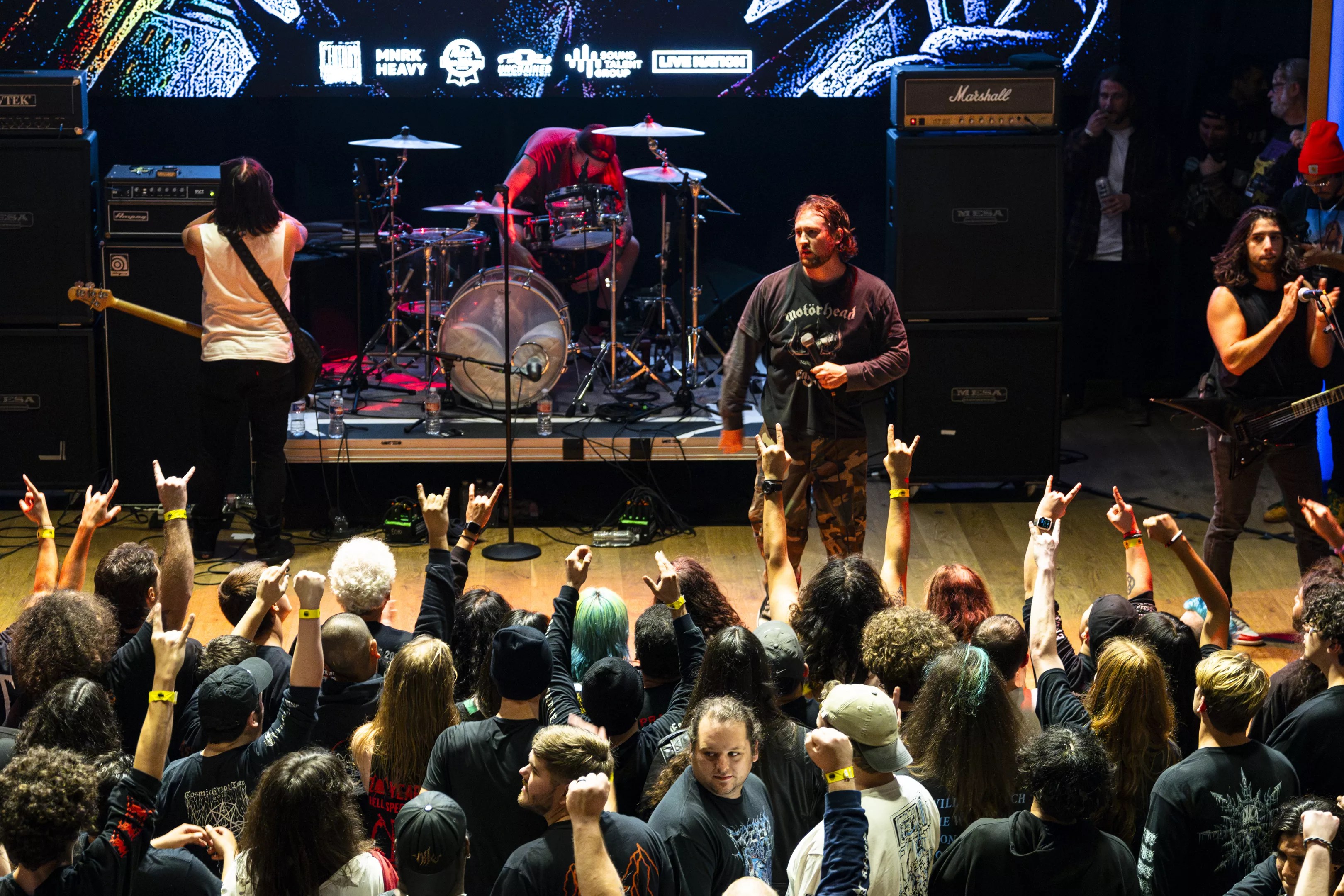
Fugitive is one of DFW’s best among the new crop of metallic hardcore.
Elijah Smith
Crowd attendance lately is like “night and day” compared with the early scene, says Stewart, who books local shows at Double Wide in Dallas. Social media makes it easy to spread the word about gigs, and venues like Rubber Gloves in Denton often enjoy huge turnouts.
To Stewart, it’s clear that the metallic-hardcore style is resonating with listeners.
“Everybody has something to say nowadays, and there’s a lot of stupid shit going on in the world,” he says. “So, what better way to express it than heavy music?”
The DFW scene is the one to watch for quality bands, Stewart says, pointing to Frozen Soul, Creeping Death, Tribal Gaze, Laughing Matter, Proxy, Ozone and Urn as examples. Other Texas groups on his radar include Mexican Coke, Skourge (frontman Seth Gilmore also screams for Fugitive), Criaturas and Inner Self. The list could go on.
For many, growing up in the Lone Star State instills a blue-collar work ethic, Stewart says. They know they’ll have to bust their ass and grit their teeth to see results. Looking back on Power Trip’s rise to metal stardom, it took luck, determination and a willingness to grind.
Today’s scene is in a good spot, he adds: “It seems to be getting bigger and there’s more bands.
“And when more bands are around, there’s better bands.”
***
The dense air on the night of Sunday, Aug. 20, feels like Satan left the broiler on and the oven door open. Metallica’s second-night set at AT&T Stadium in Arlington is well underway, pyrotechnics ablaze, and no one in the audience cares that they’re about to start the workweek dehydrated and hungover.
Even at 60, frontman James Hetfield’s energy could outlast the Duracell rabbit. He takes a moment between songs to warmly welcome first-timers to the Metallica “family.”
Two days before, the afternoon that Fugitive had been set to play before infernal temps intervened, Metallica gave the band a boost. In a post shared with 6.1 million X followers, Metallica encouraged fans to check out “the awesome guys from Fugitive” at South Side Ballroom that Saturday.
Drummer Mullins, who wields sticks for Fugitive and DFW death metal corps Creeping Death, highlighted the moment on X.
“Metallica said my band are some awesome guys,” he wrote, along with a grinning emoji.
Metallica said my band are some awesome guys 😠https://t.co/TSOLPgJ6Tj
— l*ncoln (@chainlinc1) August 18, 2023
In late September, guitarist Trey Pemberton meets me for lunch at Cool Beans, the Denton dive bar once frequented by many in the local scene. Several years ago, Pemberton and company decided to start a band called “Creeping Death,” which also happens to be the name of an old-school Metallica single. It’s still way too hot outside, so Pemberton and I pull up to a tall table in Beans’ back room.
Creeping Death’s schedule is consistently full. The band toured overseas with Goatwhore and Revocation earlier this year. It also played extensively in the U.S. this summer to mark the release of second album Boundless Domain, which charted on Billboard.
Pemberton explains that, over the past 15 years or so, the scene in North Texas has generated regular output. One band will blow up, then another comes in to close the gap before getting big themselves. Creeping Death filled a void when members saw an opening for a heavier type of metal. Quality music begets quality music.
“I think the foundation that was laid real early on was such a good foundation, that it just kind of keeps going,” Pemberton says, describing a sort of perpetual motion machine.
“People are also willing to help other people out around here as far as the music goes,” he adds. “Somebody’s always putting on for someone, always trying to help the homies along.”
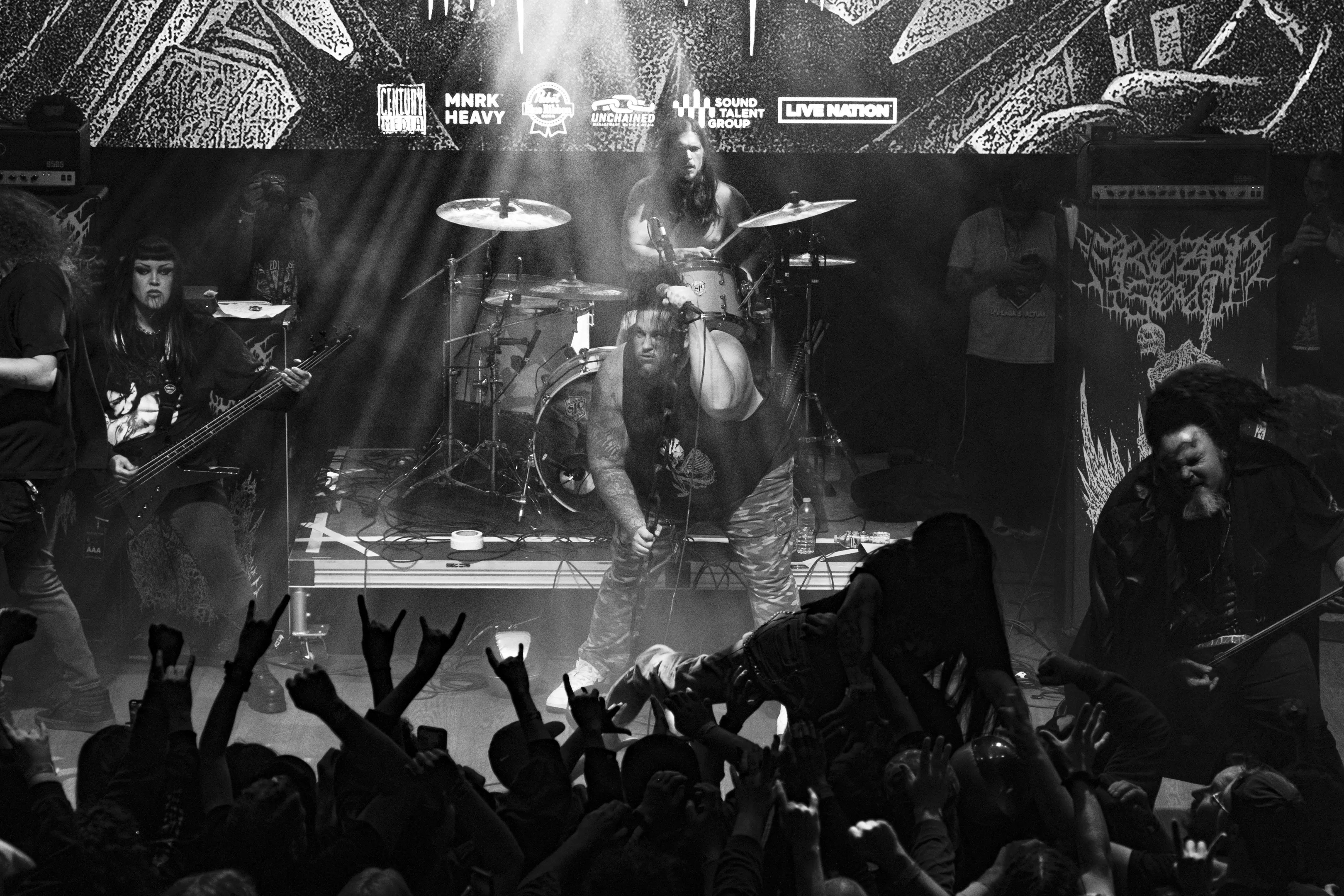
Frozen Soul set the crowd ablaze at Wrecking Ball.
Elijah Smith
Many of the musicians with whom I spoke, including Pemberton, mentioned a spike in show attendance in recent days. Before the pandemic, he’d noticed that the median age at shows was creeping up. But now, loads of de-quarantined kids are pouring into venues after spending COVID-19 itching for concerts to return.
Social media has helped introduce younger listeners to heavier music, Pemberton says. He jokes that he’s going to “sound like a Boomer” before explaining that, back when he was in school, algorithms weren’t there to reinforce exposure to a certain genre.
For example, Pemberton would wake up for football practice early in the morning, turn on MTV while getting ready and watch whatever random music video was on. Whether he actually liked what he saw was the luck of the draw.
But kids today can take deep dives into subversive music that used to be less accessible.
“Now, everything is algorithmic; you seek out something that you want to seek out,” Pemberton says. “It’s like you have blinders on and the algorithm is only going to point you in that direction.”
North Texas’ metal scene is diverse and boasts “all types of genres, subgenres, people, ages,” says bassist Dave Spencer of Devourment, the Dallas slam death metal behemoths. The region’s success can be attributed in part to the availability of venues that still host extreme music: “So many other areas of the country have lost those opportunities.”
Foreign touring bands love to stop in Texas, Spencer says; the fans are highly dedicated and friendly.
Death metal here has earned substantial respect from around the globe, he continues. Saying you’re from the Lone Star State “carries a heavy weight.” And North Texas thrashers have succeeded in perfecting a sound first spawned in the 1980s.
The three best words to describe the scene, according to Spencer? “Dedication, pride and family.”
***
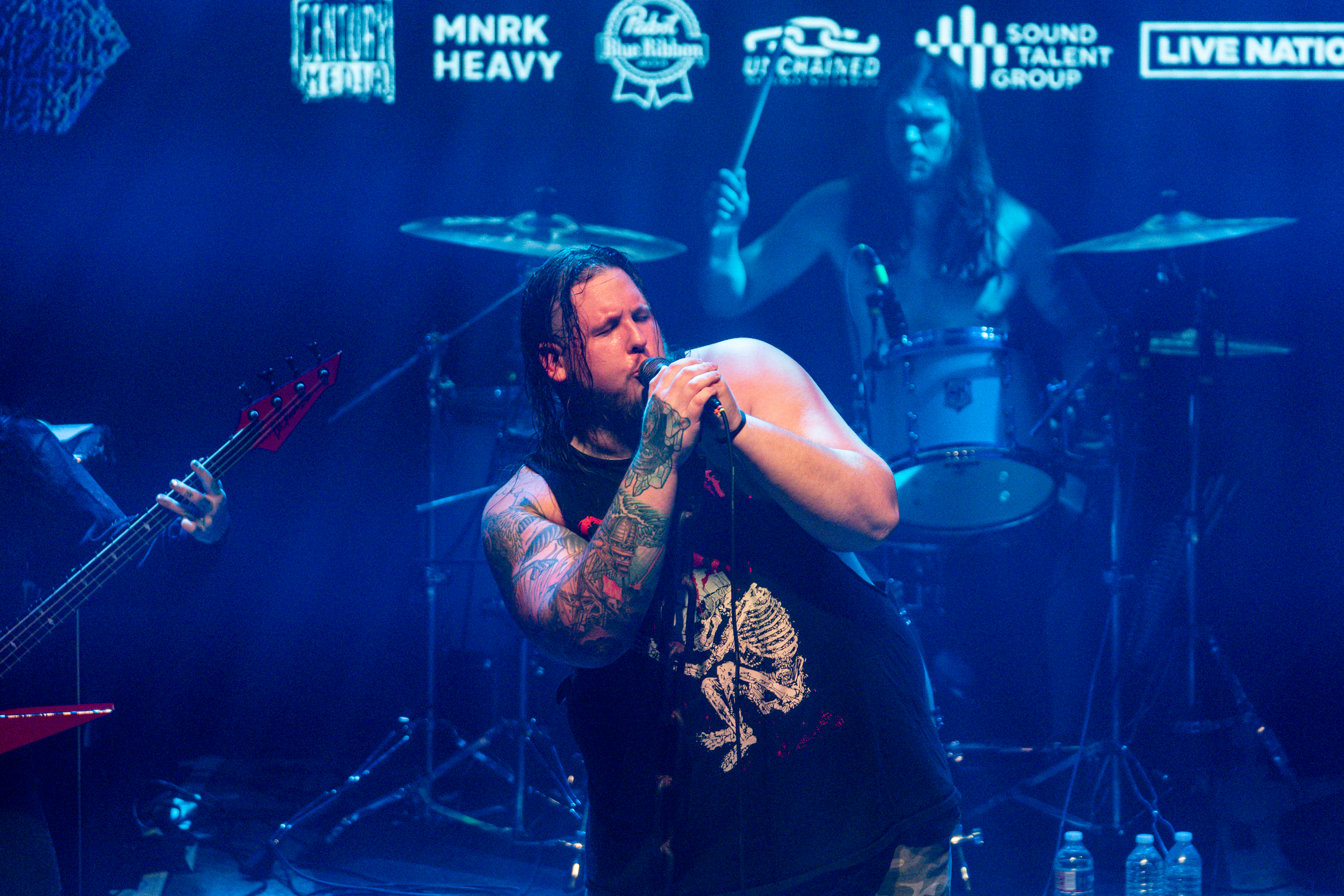
Frozen Soul vocalist Chad Green performs at Wrecking Ball in October.
Elijah Smith
Black and silver beach balls soar through the air at Wrecking Ball Metal Madness, punctuated by a sinister riff. Frozen Soul vocalist Chad Green orchestrates a Magic: The Gathering match, directing the crowd to form a circle pit around the fantasy trading card game.
“Let’s go – faster! Faster! Faster!” Green bellows. The pit accelerates, rushing counter-clockwise, as the players kneel and sit cross-legged on the beer-soaked floor.
The moment went viral on social media and attracted write-ups by Metal Injection and Loudwire.
They’re playing Magic in the middle of the the pit during Frozen Soul lmao pic.twitter.com/3QgYXHSchC
— Dumpster Jesus (@DumpsterJesus) October 29, 2023
Frozen Soul has accomplished much since the debut of its 2019 demo, Encased in Ice. The band released sophomore album Glacial Domination this year to glowing reviews; Blabbermouth‘s write-up awarded it a 9/10 and lauded Texas as “the epicenter of death metal right now.”
One evening in mid-November, Green calls from a greenroom at a gig in Chicago. Frozen Soul is on a weeks-long tour and the shows so far have been packed, close to if not fully sold out.
It wasn’t that long ago that Frozen Soul was playing venues across the U.S. in support of titans like Napalm Death, Dying Fetus and The Black Dahlia Murder, Green says. Now, his group is headlining many of the same spots: “It’s a little bit surreal, because it kind of feels like we’re not supposed to be there, but it’s cool. It’s really cool.”
To Green, the heavy music scene in North Texas has seemed healthy since his arrival. As someone who’d been a “loner,” he immediately made a ton of friends upon entry. Riley Gale was one of the musicians who was “super nice and super inviting” to Green.
Power Trip’s takeoff helped to cement the region as a hotbed, he says. They were for Dallas and for Texas the way that Pantera had been.
“I think like 2008 when Power Trip became a band, that’s when it really exploded,” Green says, adding that Gale’s previous outfit, Balls Out, used to play rowdy rooms. “It was packed and it was awesome. Everyone had a good time and it was violent, and everyone left with stories and bloody noses.”
Violence was no stranger to Power Trip shows. Fans at one local, dimly lit gig in 2012 hurled tables, swung folding chairs and lit banners on fire.
Green used to play in other North Texas heavy bands: All Will Fail, End Times and Vulgar Display. Then he met Frozen Soul guitarist Michael Munday and started writing death metal. Green says that many up-and-comers have followed the lead of Power Trip, the “first band from DFW to get out there and really tour hard” and carve out a name for themselves.
The way Green sees it, Texas’ geography also plays a role in its unique scene, which he earnestly counts as the best in the world. We’re separated from the country’s major markets, and it takes considerable time and resources to travel out of state. We’re also the largest state in the contiguous U.S. and situated in the center of the South.
Instead of searching beyond our borders, everyone in Texas looks to one another for inspiration and aid. That’s why “you have such a condensed amount of sick bands,” Green says.
“I think that being separated and not having the luxury of driving an hour to go to another state … just added to that Texas charm that you hear in all these bands’ music, because we had to make do with what we have,” he continues. “We couldn’t get out and go do the cool stuff you could see on the internet, you know? Texas fucking rules and that’s it.”
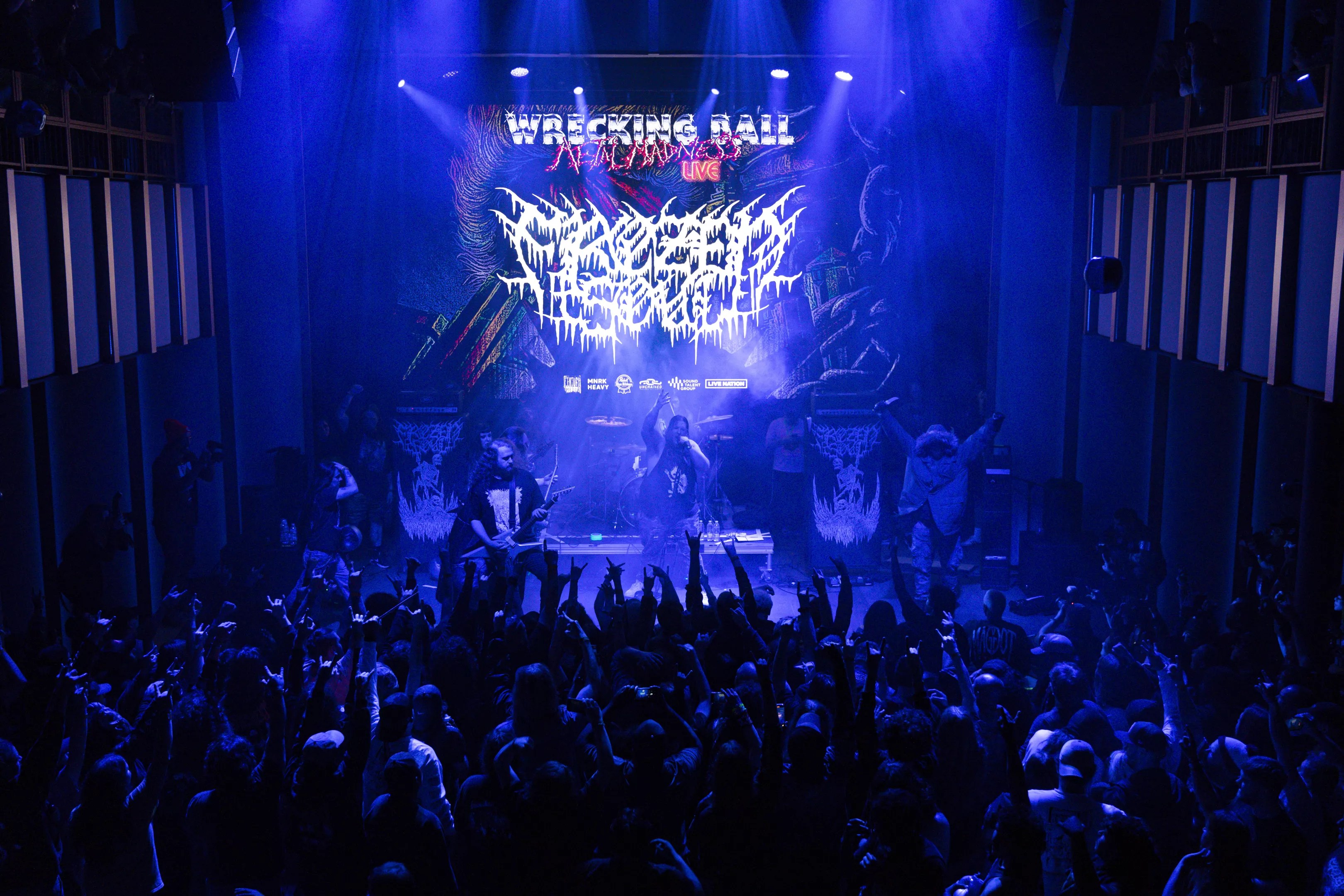
Death Metal from Dallas — Frozen Soul.
Elijah Smith
Heading into this story, I sought a succinct answer to a central guiding question: What is it about DFW-bred subversive music that sets it apart from the rest? A lightbulb went off after I heard Green’s theory.
It’s groove.
From Pantera to Power Trip, North Texas is steeped in a groove-centric, rhythmic sound, Green says. If a song doesn’t hit in that way, then it won’t live up to the region’s standard. That je ne sais quoi is still present in current bands like Frozen Soul, Creeping Death and Tribal Gaze, plus Kublai Khan, Ballista and Soledad.
But it goes beyond groove. Dallas’ singularly inclusive scene, one that so seamlessly bridges the divide between hardcore and metal, also acts as a “big family.”
Three days before Halloween, back at Wrecking Ball Metal Madness, ice-blue hues bathe Green onstage as he takes a beat to thank the crowd.
“From this point on, the rest of this set goes out to the ones we lost,” he says. “I’ve said it before and I’ll say it until the end of time: Mental health is not a fuckin’ joke. Take care of each other, please. Please take care of each other. Call your friends and family.”
Green honors those who’ve lost their lives too young, including his late brother Cory, Wade Allison of Iron Age and Gale.
He then growls a command.
“Move this fuckin’ pit!”
The pit abides.